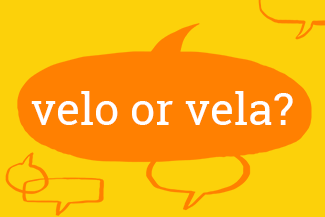Here we are – another opportunity to lift the veil on a further two superficially similar Spanish nouns and reveal their different uses: these are velo (masculine) and vela (feminine).
You can listen to the pronunciation of velo here:
The less common of the two is velo (masculine), which, as hinted at earlier, means veil (as in a covering sometimes worn by women over the head and face):
Las mujeres cubrían su cara con el velo negro.
The women covered their faces with black veils.
Se casó con un tradicional vestido de novia, con velo y ramillete de flores.
She got married in a traditional wedding dress, with a veil and a bouquet of flowers.
El velo is also used figuratively:
Hemos comenzado a levantar el velo sobre los orígenes de esta práctica.
We have begun to lift the veil on the origins of this practice.
Prefieren correr un velo sobre este asunto.
They prefer to draw a veil over this matter.
Let’s move on to vela (feminine), whose pronunciation can be heard below.
Vela has three main meanings.
Una vela may be a candle that you light, for instance to create a romantic atmosphere or because there’s a power cut at night:
Encendió una vela.
He lit a candle.
Apagué la vela.
I put out the candle.
una cena íntima con velas y música
an intimate dinner with candles and music
Another meaning of una vela is a sail, as in the canvas sheet that catches and harnesses the wind on a yacht or an old-fashioned sailing boat:
Las velas se hincharon al viento del océano.
The sails swelled in the ocean wind.
El viento golpeó otra vez la vela con toda su potencia.
The wind battered the sail again with all its force.
La vela may refer to sailing as a sport:
el catamarán típico de la vela
the typical catamaran used in sailing
el mundo de la vela
the world of sailing
To make plain sailing of more nouns that are identical in form except for their ending (and gender), join us next week.



